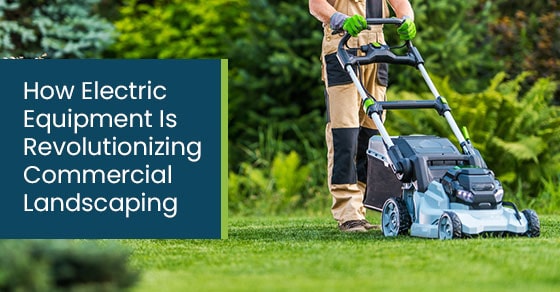How Electric Equipment Is Revolutionizing Commercial Landscaping

From electric cars to electric lawnmowers, the electrical revolution is here. It’s changing a wide variety of industries, including the world of commercial landscaping.
So, what do you, as a commercial landscaping company, need to know going forward? Peel Exterior Maintenance takes a deep dive into the advantages and disadvantages of the electrical equipment revolution.
5 Advantages of Electrical Landscaping Equipment
1. Lower operating costs
Commercial electrical equipment costs less to operate than their gas-powered counterparts. These reduced operational costs can be attributed to lower maintenance requirements and fewer breakdowns.
Electrical equipment has fewer moving parts, so there are less things that can go wrong and necessitate a repair. Additionally, you don’t have to worry about buying air filters, oil, or other replacement parts.
2. No fuel costs
Fuel prices fluctuate significantly, resulting in unpredictable operational costs. Furthermore, high gas and diesel prices quickly add up. Since commercial landscaping companies must own entire fleets of gas-powered equipment, fuel costs are substantial.
You can spend a fortune running your equipment, which eats into profits. The cost of electricity, on the other hand, is more stable and affordable. Consequently, switching to electrical equipment has long-term financial benefits.
3. Less maintenance
Gas-powered equipment has a lot of moving parts, which can (and will) break without proper and ongoing maintenance. A small engine repair company, like Peel Exterior Maintenance, can help keep your equipment running effectively and efficiently.
Nonetheless, some commercial landscapers may prefer electrical equipment with its lower maintenance requirements. With electric tools, you spend less time (and money) on maintenance and more time getting the job done for your customers.
4. Quieter operation
Landscaping is noisy work, which can be a problem in urban and residential areas. Traditional gas-powered equipment is notoriously loud. It adds to local noise pollution, disrupts peace and tranquility, and irritates residents.
Conversely, electric outdoor power equipment will not disturb anyone. It operates quietly, even as you tackle mowing, blowing, and other maintenance tasks. Plus, it’s easier to work around noise restrictions that would prohibit gas-powered landscaping.
5. Environmentally friendly
Another attractive advantage of electrical landscaping equipment is sustainability. Obviously, gas-powered tools require gas to operate. This means they also produce greenhouse gas emissions and fumes, which are bad for the environment and contribute to local pollution.
Electrical equipment is a zero-emission alternative. It reduces your carbon footprint, preserves local air quality, and helps you appeal to eco-conscious clients.
5 Challenges of Electrical Commercial Landscaping Equipment
1. Initial costs
Electrical landscaping tools come with higher price tags. Consequently, going electric is a considerable investment. Switching your entire diesel engine fleet to an electric one is going to be expensive, even if you will enjoy lower maintenance and operational costs afterward.
For many commercial landscaping companies, it can be more economical to invest in maintaining your current equipment rather than replacing it. Fortunately, Peel Exterior Maintenance’s small engine repair services can help.
2. Battery limitations
Batteries have come a long way in recent years. Nonetheless, they still have their limitations. Electric equipment has significant run-time restrictions that can hinder commercial landscaping operations.
For large-scale or all-day projects, you should invest in multiple batteries and charging stations to keep operations running smoothly. This increases initial operation costs. Diesel engines, conversely, can be quickly refuelled. You can thus avoid unnecessary and costly downtime.
3. Durability issues
Gas-powered equipment is very durable, making it ideal for all types of landscaping and exterior maintenance tasks. You can work in rugged environments with dust, debris, and moisture without a second thought.
Furthermore, diesel engines can withstand tough weather conditions, like snow, sleet, and rain. Electrical tools may not be as durable or versatile.
4. Reduced performance
There are still concerns surrounding the performance of electrically powered landscaping equipment. Commercial landscaping requires robust tools able to perform in a variety of extreme conditions for long periods of time. Gas engines perform better in heavy-duty applications than their electrical cousins.
5. Infrastructure upgrades
Lastly, switching to an electrically powered fleet often requires adding supplementary infrastructure. After all, you need a way to charge batteries quickly and efficiently. You also require ample storage space for the number of batteries needed to power a commercial landscaping operation.
Examples of Electrical Equipment in the Commercial Landscaping Industry
Lawn Mowers
Electric lawnmowers are gaining popularity for their advanced features (like sensors), power, and quiet operation.
Blowers
Electric blowers operate practically noiselessly, making them an ideal choice in noise-sensitive areas.
Trimmers and Edgers
Electric trimmers and edgers are lightweight and precise tools that help commercial landscapers achieve professional-looking edges.
Chainsaws
Electric chainsaws have less vibration than gas-powered alternatives, so you can prune trees and shape shrubs with greater precision.
How to Get More Out of Your Small Diesel Engines
Small diesel engines still have considerable advantages over electrical equipment. Their consistent power and robust durability are hard to beat. Plus, the initial investment is much more doable, especially for smaller commercial landscaping companies. However, these engines require a little more TLC to continue performing optimally.
Regular maintenance is crucial for the performance and longevity of diesel power equipment. Otherwise, you’ll encounter unexpected breakdowns, premature engine failure, and significant drops in performance.
Peel Exterior Maintenance offers comprehensive maintenance services, including inspections, tune-ups, rebuilds, and repairs, to keep your small engine equipment performing at its best.
If your equipment is already experiencing problems, we do repairs as well. Our skilled technicians also rebuild small engines that are exhibiting signs of extensive wear and tear.
Professional Small Engine Repairs From Peel Exterior Maintenance
Peel Exterior Maintenance is your hub for commercial landscaping. We are STIHL-certified, and we sell, rent, and repair outdoor power equipment.
Additionally, we specialise in the routine maintenance and repair of small engines. Our technicians perform engine rebuilds, tune ups, and routine maintenance to keep your equipment running at top speeds.
To learn more about small engine repair and maintenance, call Peel Exterior Maintenance at 1-905-873-8988 or contact us here.
